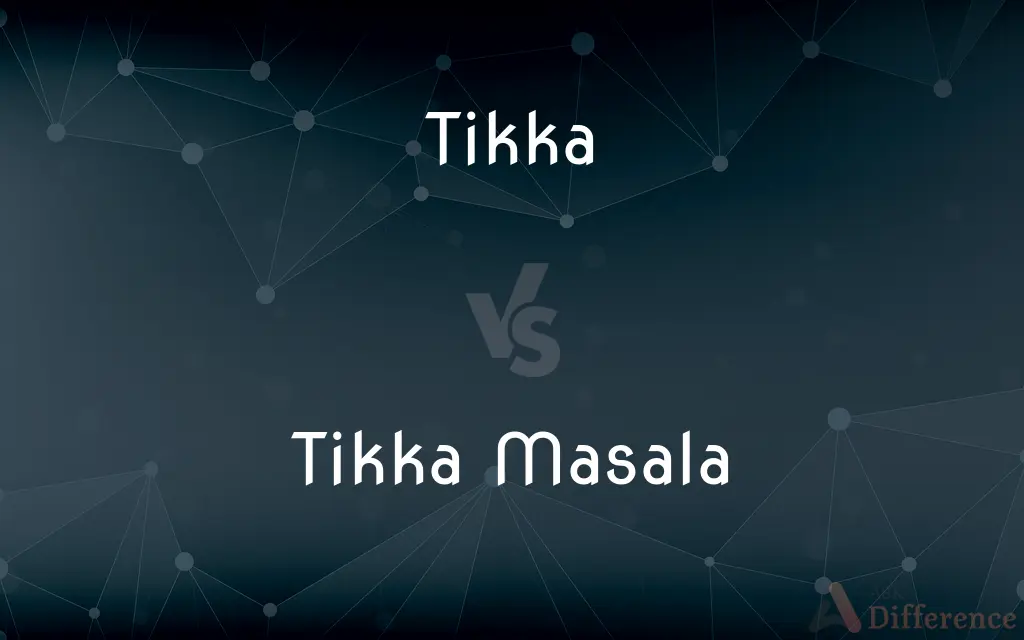Tikka vs. Tikka Masala — What's the Difference?
By Tayyaba Rehman & Fiza Rafique — Published on October 19, 2024
Tikka refers to bite-sized pieces of meat marinated and cooked in a tandoor, while Tikka Masala is a dish where tikka meat is served in a creamy, spiced tomato-based sauce.

Difference Between Tikka and Tikka Masala
Table of Contents
ADVERTISEMENT
Key Differences
Tikka and Tikka Masala, both staples in Indian cuisine, differ mainly in preparation and presentation. Tikka involves marinating pieces of meat, like chicken or lamb, in a mixture of yogurt and spices before cooking them in a tandoor (a cylindrical clay oven). This process gives tikka its distinctive smoky flavor and tender texture, making it a popular appetizer or snack.
Tikka Masala, on the other hand, takes the cooked tikka and immerses it in a rich, creamy sauce. This sauce is usually made with tomatoes, cream, onions, and various spices, including garam masala, cumin, and coriander, creating a flavorful and slightly spicy curry. The dish is often garnished with fresh coriander and served with rice or naan bread, making it a hearty main course.
The origins of Tikka Masala are often debated, with some claiming it was invented in the UK by Indian chefs adapting to Western tastes. In contrast, tikka has clearer roots in the Indian subcontinent, specifically in the Punjab region. Regardless of its origin, Tikka Masala has become a beloved dish worldwide, representing Indian cuisine in many international contexts.
Tikka is appreciated for its simplicity and smoky flavor, while Tikka Masala is celebrated for its complexity and the balance of spices in its sauce. Choosing between them depends on one's preference for dry versus saucy dishes, but both offer a taste of the rich flavors and culinary techniques of Indian cooking.
Comparison Chart
Definition
Bite-sized pieces of meat marinated and cooked in a tandoor.
Tikka served in a creamy, spiced tomato-based sauce.
ADVERTISEMENT
Main Ingredients
Meat, yogurt, spices.
Meat, yogurt, spices, tomato, cream, onions.
Cooking Method
Grilled in a tandoor.
Grilled in a tandoor, then simmered in sauce.
Flavor
Smoky, spicy.
Creamy, rich, mildly spicy.
Serving
Often served as an appetizer or snack.
Served as a main course with rice or naan.
Origin
Indian subcontinent (Punjab region).
Debated, possibly UK or Indian subcontinent.
Compare with Definitions
Tikka
Marinated and grilled meat chunks.
Chicken tikka is marinated overnight for maximum flavor.
Tikka Masala
Tikka in a creamy tomato sauce.
Tikka masala's rich sauce is irresistible.
Tikka
Cooked in a tandoor oven.
The tikka was perfectly charred in the tandoor.
Tikka Masala
Combines smoky and creamy flavors.
The tikka masala offered the perfect balance of smoky and creamy tastes.
Tikka
Served with sides like chutney.
He enjoyed his tikka with mint chutney and onions.
Tikka Masala
Often garnished with coriander.
A sprinkle of coriander enhanced the tikka masala.
Tikka
Popular in Indian cuisine.
Tikka is a must-have at any Indian barbecue.
Tikka Masala
A fusion of Indian and other cuisines.
Tikka masala is a favorite in Indian and British restaurants alike.
Tikka
Features a smoky taste.
The smoky flavor of the tikka set it apart.
Tikka Masala
Served as a curry dish.
She ordered chicken tikka masala with naan.
Tikka
A South Asian dish consisting of pieces of chicken or other meat marinated in yogurt and spices and cooked on a skewer.
Tikka
A marinade made from various aromatic spices usually with a yoghurt base; often used in Indian cuisine prior to grilling in a tandoor.
Common Curiosities
What is the main difference between tikka and tikka masala?
Tikka is marinated and grilled meat, while tikka masala includes the same meat in a creamy tomato-based sauce.
Can tikka be eaten alone?
Yes, tikka can be enjoyed as a standalone dish, often accompanied by sides like chutney.
Is tikka masala spicy?
The spice level of tikka masala can vary, but it is generally mild to medium, balanced by the creaminess of the sauce.
How are tikka and tikka masala served?
Tikka is often served as an appetizer, while tikka masala is a main course, usually with rice or naan.
Can vegetarians enjoy tikka masala?
Yes, paneer tikka masala is a popular vegetarian version of the dish.
What makes tikka masala sauce unique?
Its rich combination of tomatoes, cream, and spices offers a unique, flavorful experience.
Is tikka healthy?
Tikka can be part of a healthy diet when consumed in moderation, especially if made with lean meat and minimal oil.
What kind of meat is used in tikka and tikka masala?
Chicken is most common, but lamb, beef, and paneer (a type of cheese) are also used.
Where did tikka masala originate?
The origin of tikka masala is debated, with some claiming it was invented in the UK and others tracing its roots back to the Indian subcontinent.
Can tikka masala be made without a tandoor?
Yes, tikka can be grilled or baked in a conventional oven as an alternative to using a tandoor.
How long should meat be marinated for tikka?
Ideally, meat should be marinated overnight, or at least for a few hours, to enhance its flavor.
Can tikka masala be frozen?
Yes, tikka masala freezes well and can be reheated for later consumption.
How can the creaminess of tikka masala sauce be adjusted?
Adjusting the amount of cream or using alternatives like yogurt or coconut milk can vary the sauce's creaminess.
What are some common spices in tikka marinade?
Common spices include garam masala, cumin, coriander, and turmeric.
Is tikka masala considered authentic Indian cuisine?
While popular in Indian cuisine, tikka masala's exact origins are debated, making its authenticity a subject of discussion.
Share Your Discovery

Previous Comparison
Screen Printing vs. Sublimation Printing
Next Comparison
Atomic Absorption vs. Atomic EmissionAuthor Spotlight
Written by
Tayyaba RehmanTayyaba Rehman is a distinguished writer, currently serving as a primary contributor to askdifference.com. As a researcher in semantics and etymology, Tayyaba's passion for the complexity of languages and their distinctions has found a perfect home on the platform. Tayyaba delves into the intricacies of language, distinguishing between commonly confused words and phrases, thereby providing clarity for readers worldwide.
Co-written by
Fiza RafiqueFiza Rafique is a skilled content writer at AskDifference.com, where she meticulously refines and enhances written pieces. Drawing from her vast editorial expertise, Fiza ensures clarity, accuracy, and precision in every article. Passionate about language, she continually seeks to elevate the quality of content for readers worldwide.















































